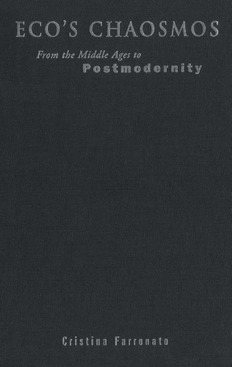Table Of ContentECO'S CHAOSMOS
From the Middle Ages to Postmodernity
While Umberto Eco's intellectual itinerary was marked by his early stud-
ies of post-Crocean aesthetics and his concentration on linguistics, in-
formation theory, structuralism, semiotics, cognitive science, and media
studies, what distinguishes his critical and fictional writing is the ten-
sion between a typically medieval search for a code and a hermeneutic
representative of deconstructive tendencies. This tension between cos-
mos and chaos, order and disorder, is reflected in the word chaosmos.
In this assessment of the philosophical basis of Eco's critical and
fictional writing, Cristina Farronato explores the other distinctive as-
pect of Eco's thought - the struggle for a composition of opposites, the
outcome deriving from his ability to elicit similar contrasts from the
past and replay them in modern terms. Focusing principally on how
Eco's scholarly background influenced his study of semiotics, Farronato
analyses The Name of the Rose in relation to William of Ockham's episte-
mology, C.S. Peirce's work on abduction, and Wittgenstein's theory of
language. She also discusses Foucault's Pendulum as an explicit comment
on the modern debate on interpretation through a direct reference to
early modern hermetic thought, correlates The Island of the Day Before as
a postmodern mixture of science and superstition, and reviews Baudolino
as a historical/fantastic novel that again situates the Middle Ages in a
postmodern context. Demonstrating Eco's use of semiotic theory, Eco's
Chaosmos shows how critical models of the past map contemporary lit-
erature and culture.
(Toronto Italian Studies)
CRISTINA FARRONATO is an assistant professor in the Department of Ro-
mance Languages and Literatures at Colgate University.
This page intentionally left blank
ECO'S CHAOSMOS
From the Middle Ages
to Postmodernity
Cristina Farronato
UNIVERSITY OF TORONTO PRESS
Toronto Buffalo London
www.utppublishing.com
University of Toronto Press Incorporated 2003
Toronto Buffalo London
Printed in Canada
ISBN 0-8020-8789-2 (cloth)
ISBN 0-8020-8586-5 (paper)
Printed on acid-free paper
Toronto Italian Studies
National Library of Canada Cataloguing in Publication
Farronato, Cristina
Eco's chaosmos : from the Middle Ages to postmodernity /
Cristina Farronato.
(Toronto Italian studies)
Includes bibliographical references and index.
ISBN 0-8020-8789-2 (bound). ISBN 0-8020-8586-5 (pbk.)
1. Eco, Umberto - Criticism and interpretation. I. Title.
II. Series.
PQ4865.C6Z645 853'.912 C2003-903967-6
This book has been published with the help of a grant from the Italian
Foreign Ministry and the Istituto Italiano di Cultura, Toronto.
University of Toronto Press acknowledges the financial assistance to its
publishing program of the Canada Council for the Arts and the Ontario Arts
Council.
University of Toronto Press acknowledges the financial support for its publish-
ing activities of the Government of Canada through the Book Publishing
Industry Development Program (BPIDP).
To Sylva and Dario
This page intentionally left blank
Contents
List of Figures xi
Preface xiii
Acknowledgments xv
1 Introduction 3
2 From Cosmos to Chaosmos: Eco and Joyce 8
Between Order and Chaos: A Theory of Semiotics 9
The Middle Ages of Umberto Eco 11
Analogy as Epistemological Tool: Nicholas of Cusa 17
Into the Renaissance: Giordano Bruno and the Logic of
Symbols 23
From Logic to Wit: Emanuele Tesauro and the Power of
Metaphor 25
The Evolution of Eco's Thought 29
3 Semiotics as a Solution: From a Theory of Aesthetics to the
Study of Culture 32
Pareyson and Aesthetic Theory 32
From Semiology to Semiotics 37
The Study of Mass Culture 45
Opera aperta and Medieval Thought 49
From Apocalittici e integrati to Il superuomo di massa 52
Counterculture and Cultural Studies 56
viii Contents
4 The Aesthetics of Reception and the Reflection on the Reader:
From the Labyrinth to the Southern Seas 61
Eco's Theoretical Writings on Interpretation and the Role of the
Reader 65
'Who's Guilty? ': The Doomed Reader in The Name of the Rose 80
'It's the Reader's Fault': Foucault's Pendulum 84
Postmodernism and Baroque in The Island of the Day Before: The
Multiplied Reader 91
Baudolino, Reader/Writer 102
5 Intertextuality: The Middle Ages, Postmodernity, and the
Use of Citation 106
Techniques of Citation in the Middle Ages 107
Postmodern Quoting and Eco's Novels 109
Eco, Borges, Postmodernism, and Play 113
Calvino's 'Multiplicity' and Postmodern Fiction 117
6 A Theory of Medieval Laughter: The Comic, Humour, and Wit 123
The 'Bustine di Minerva' 129
The Power of the False 138
7 The Whodunit and Eco's Postmodern Fiction 140
The Theory of Abduction and The Name of the Rose 146
Medieval Aspects of a Postmodern Whodunit The Computer and the
Kabbalah 155
In the Swing of the Pendulum 161
8 Baudolino and the Language of Monsters 169
History, Fiction, and the Realm of Monsters 171
In the Land of Monsters 175
Baudolino and Negative Theology 180
The Power of Falsity: Baudolino's Own Monstrosity 187
Monsters between Chaos and Cosmos 190
9 Conclusion 192
Experiences in Translation and Sulla letteratura 195
Contents ix
Appendix A 199
Appendix B 205
Notes 209
Bibliography 229
Index 241

